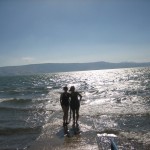This is What Happens When Police Detain a Woman in Iran

On the long ride to the Tehran airport I took one last look at the streets of the city. Then I thanked the universe that I had steered clear from the authorities during my stay.
Returning to Iran after two decades, I entered the country with trepidation. Years ago in Paris, my cousin Rana stopped to watch a group of people protesting Iran’s government from afar. Unbeknownst to her, she was photographed as part of the crowd. Months later, on her visit to Iran to see family, she was arrested at the Tehran airport, held for a night in prison, and banned from ever leaving the country. Just like that.
Unfortunately, the government hasn’t changed much, and rules seem to morph arbitrarily. The authorities could have stopped me because of my clothes, something I did unknowingly, entry documents, or simply because they were having a bad day. In Iran, one never knows.
To my great relief, when I entered Iran they simply asked a few questions and welcomed me back. I came to visit family and do some sightseeing for three weeks, but owing to my spontaneity, the trip had stretched into two months. Actually, it was more like one part spontaneity, two parts guilt. Specifically, parental guilt. They actually used the “you know we are not getting any younger” phrase to make me stay longer. It worked.
The authorities could have stopped me because of my clothes, something I did unknowingly, entry documents, or simply because they were having a bad day. In Iran, one never knows.
After two months, I was back at the airport. Having spent all of my Iranian currency I was anxious about the exit fee, despite my mother having reassured me that U.S. citizens need not pay. When my turn came I faked a smile and approached the counter. The agent took my Iranian passport and scanned it. No word about fees, thank God. As I waited to take the passport back, hand outstretched, he looked at me and paused.
My stomach clenched.
Then, in a disaffected tone, he said, “I’m sorry, but you can’t leave.”
“Excuse me?” I stammered.
“You can’t go,” the agent stated.
My mind started racing to any of my activities that could have been considered illegal, since privacy does not exist in Iran. I quickly ruled out Facebook; since the government monitors nearly all electronic activity I had steered clear from it. Had I said anything in emails? Maybe an article I had submitted? Phone conversations?
This is What Happens When Police Detain a Woman in Iran
With sunken eyes, I asked, “I’m sorry, what do you mean?”
“Your passport has expired,” the agent pointed out.
“Wait, no, here.” I presented my American passport. “See, expires in 2013.”
“Yes, but you don’t have an entrance visa in it. You can’t leave the country.”
“That’s impossible. I have a job interview in the States on August 15th,” I protested.
“Follow me.” He motioned for me to come with him.
This is Iran. Following a government agent can mean anything from a regular conversation to prison. There have even been reports of rapes by the religious police.
I could hardly breathe while following the agent to an office with two grim-faced officers inside. My usual communication savvy failed me at 12:30 am. Persian words tangled up with English forced me to pause before speaking. Even my body was confused. The feminine charm I call upon in the U.S. as a method of persuasion is not only useless, but also quite dangerous in a religious culture dominated by masculine authority. Besides, an Iranian woman turned American has chosen a life of “sin.”
The feminine charm I call upon in the U.S. as a method of persuasion is not only useless, but also quite dangerous in a religious culture dominated by masculine authority.
The officer, refusing to look at me, checked something in his computer and reiterated that I couldn’t leave. Teary-eyed, I started attempting to reason with him, promising to renew my passport as soon as I got back.
“Charge me a fee. Anything. Just let me go,” I pleaded.
The part of me that does not accept authoritative force, the one that remembered life in Iran after the revolution, refused to say “please.” I knew that the bastard not only wanted submission, but most likely envied my freedom.
“This is not our responsibility. Go to the passport office in the morning.” He tore up my ticket and sent me to collect my belongings. Two more hours passed. While waiting there at three in the morning utterly exhausted, horrified at what they had the gall to do, I still felt a rush of relief realizing that they’d let me go.
The next day, infuriated, I arrived at the passport office, a revolutionary ready to take back what belonged to me. One of the soldiers sitting at the entrance examined my papers and sent me to the superintendent’s office.
I marched into his office wearing my head-cover in a way that challenged the Islamic Republic’s standards. My mother had glared at me and warned against it, but I couldn’t help it. Somehow, the urge to fight this man who represented the unjust government overshadowed my own future. Standing my ground and showing my individuality took precedence.
“Your passport isn’t here. Come back Monday or Tuesday,” he declared.
“You don’t understand. I have to be in the U.S. on Monday. Can you check again?”
Without making eye contact with me he said, “Fine then. Try back tomorrow.”
“Should I change my ticket?” I asked.
“No!” barked the bearded thug. “I said check back.”
Too angry to register his harsh rebuke, I left still feeling slightly justified.
The following morning, I realized I had dodged another bullet and decided to accept my mother’s reproach. With my scarf worn “correctly,” I kept a distance from the officer’s desk and waited for his attention. He sent me from one building to another. Each time, after standing in long lines, I was referred back to his office, where I waited by the door until he acknowledged me, only to send me on another wild-goose chase.
I knew that the bastard not only wanted submission, but most likely envied my freedom.
At last, he called, “Anooshahr.” Not Miss, not Doctor. Growing up, I did well academically, but my mischiefs constantly landed me in the principal’s office. When he called me by my last name, I once again became that little girl standing before the principal.
“Yes, sir,” I answered. He had won, successfully asserting his power and status. Only then did he reach into his desk drawer to miraculously find my missing passport.
Every battle has its price. In a country where citizens have so few rights, a conspicuous fight may only create more obstacles. Even the most stubborn need to play by the rules sometimes in order to get what they need.
This is What Happens When Police Detain a Woman in Iran photo credit by Unsplash. Have you traveled to Iran? Email us at [email protected] for information about sharing your experience with the Pink Pangea community.








